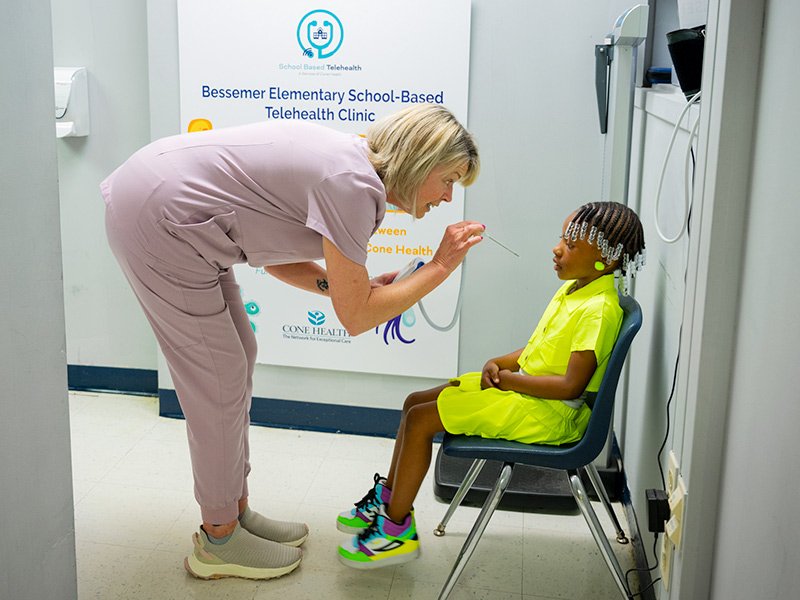The goal is to place clinics in 51 Targeted High Poverty Schools, and with partnerships and donor support we are well on the way.

When Bessemer Elementary launched Guilford County’s first school-based telehealth clinic, expanding to 51 Targeted High Poverty Schools felt not only critical but very ambitious. Effective partnerships and generous donors have enabled swift progress toward the goal.
Starting at Bessemer Elementary, where the absentee rate was highest, was a strategic choice. With the support of Guilford County Schools and The Duke Endowment, Cone Health launched the pilot project. In less than two years, we've expanded to nine schools, with plans to add seven more in the 2024-25 school year. We're making significant strides toward what might have initially seemed impossible, and absenteeism is decreasing as a result.
Placing clinics inside schools could have a profound and lasting impact on addressing learning loss and enhancing community health, particularly in areas where access to health care is challenging due to income or location. Additionally, by reducing the need for parents to leave work to pick up their children for medical appointments, we can help prevent lost wages.
“This partnership arose out of listening and understanding what the school system needs,” says CEO Mary Jo Cagle.
In school-based clinics, telepresenters are authorized to give the student medication. In most cases, students are given the care they need and sent back to class.
Donors and community partners have rallied behind the telehealth movement: $600,000 from Weaver Foundation, along with a Guilford Education Alliance grant that includes $250,000 from Healthy High Point Foundation and $2.1 million from Oak Foundation.
Additionally, the United Way and Truist Foundation are helping Cone Health build a pipeline for future site staffing. A longstanding partner with Cone Health, Truist Foundation actively supports community initiatives that build career pathways to economic mobility. When Truist learned of Cone Health’s partnership with the United Way to build a pipeline of certified medical assistants, the foundation committed $450,000 to support the program. Its generous donation ensures that the CMA Academy will not only help staff medical offices across the region but also address crucial telepresenter roles in the clinics. (see Badge of Honor, a story featuring the CMA Academy and one person whose life has been transformed because of it).
The $3 million investment from Oak Foundation shows just how far our impact can extend. An international foundation, Oak Foundation has offices globally and in Chapel Hill. When the foundation and its founder, Alan Parker, learned of Cone Health’s collaborative efforts with GCS to transform how health care and education work together, Parker committed $3 million to facilitate the expansion of the clinics, directing the grant to Guilford Education Alliance, a nonprofit that helps the school district solve challenges they cannot solve alone.
Here, within our community, our commitment to kids remains as steadfast as ever.
“The Weaver Foundation is unwavering in its commitment to the well-being of children,” says Mike and Katherine Weaver of their gift. “As our community grows and evolves, so must our strategies to ensure that kids are healthy, supported and thriving. School-based telehealth is an innovative yet logical solution to many challenges families are facing. There was no question that the Weaver Foundation would partner with Cone Health in this endeavor. The benefits of supporting our children, their families and our community in this way are simply too significant to overlook.”
In addition to garnering financial support, Cone Health now has a groundbreaking Memorandum of Understanding for collaboration with the Guilford County Health Department to partner in the care of students that will serve as a model for other programs in the state.
2023 — a great year for school-based telehealth.
- We now have nine sites open in elementary schools across Greensboro and High Point. In 2024, we will open seven more. We’re also exploring possibilities in Alamance and Rockingham counties.
- In 2024, we will open seven additional sites: Vandalia, Faulkner, Wiley, Peck, Oak Hill, Faulkner and Fairview.
- Bessemer Elementary Principal Jonathan Brooks reports significant positive impacts since the launch of school-based telehealth in his community — school attendance is 91%, the highest since before the COVID-19 pandemic, early checkouts decreased by 15%, and in grades 3-5, 60% of telehealth participants passed one or more End of Grade tests and the school met or exceeded growth in all areas of testing. demonstrating a positive impact on academic achievement.
- At a recent innovation summit sponsored by the Carnegie Foundation, school systems from Chicago, Baltimore, Ohio and Florida visited our program.
- From August to November, Bessemer’s clinic completed more than 300 telehealth visits.
- More than 1,000 students consented to treatment in our nine initial schools before the end of 2023.
- The volume of visits is steadily increasing. Recently, we set a daily record of 11 virtual visits and 25 encounters in one week. New records are achieved each week.
- We’ve signed a research agreement with Guilford County Schools to measure attendance data, school performance and behavioral data for students in the program. We will analyze this data by ethnicity, age, sex, disability status and English as a second language, and publish a report to increase understanding about the impacts of school-based telehealth in our community.
- Cone Health’s learning collaborative, supported by The Duke Endowment, now spans systems from Georgia to Virginia — and we have been invited to extend our grant.
